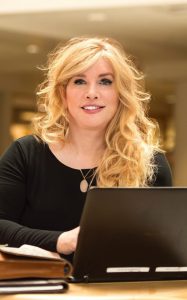
Nella Ludlow is the director of quantum computing initiatives and research professor of computer science and engineering at Wright State.
An overview of quantum computing, and how the lightning-fast data processing method has the potential to revolutionize fields like encryption, chemistry, medicine and pharmacology, will be the focus of a special lecture by a leading researcher at Wright State University.
Nella Ludlow, Ph.D., the director of quantum computing initiatives and research professor of computer science and engineering, will give a presentation on “The Excitement of Quantum Computing” on Thursday, Aug. 25, at noon in 101 Neuroscience Engineering Collaboration Building.
The presentation will also be available on Webex. Registration is required to watch the lecture online.
The lecture is sponsored by Wright State’s Department of Computer Science and Engineering as part of its Department Speaker Series.
Ludlow will include live examples in her talk, which will be accessible to everyone regardless of their knowledge of computer science, mathematics or physics. She will also discuss careers in quantum computing and the process of writing quantum computing programs.
Ludlow describes quantum computing as “one of the most exciting and fastest growing areas of computer science.”
Quantum computing harnesses the laws of quantum mechanics to process information using quantum bits, or qubits, that can represent both a 0 and a 1 simultaneously, allowing quantum computers to process information millions to trillions of times faster than normal computers.
A quantum effect known as entanglement linking two particles allows instantaneous communication — even faster than the speed of light, Ludlow said.
Quantum computing has the potential to dramatically change cryptography and encryption and provide real solutions to climate change, food production, supply chain issues or medical discoveries.
“Quantum computing promises to be a disruptive technology with such dramatic speed improvements that real tractable solutions to hard problems could be solved in hours and days,” Ludlow said. “These same problems would take hundreds of years to solve on our best supercomputers, known as classical computers, by brute-forcing their way searching through all possible solutions.”
Ludlow joined the faculty in Wright State’s College of Engineering and Computer Science in early 2022 to lead the university’s quantum computing program and establish research opportunities between the Air Force and Wright State.
She is responsible for building a research team in quantum computing and pursuing partnerships with the Defense Department, the Air Force and Wright-Patterson Air Force Base in quantum computing research, education and workforce development.
She also teaches several computer science courses, including a course on quantum computing that is open to undergraduate and graduate students.
Ludlow earned bachelor’s degrees in math and physics from Washington State University, a master’s degree in computer science from Wright State and her Ph.D. in artificial intelligence from the University of Edinburgh in Scotland. She also participated in postdoctoral work in computer science at the University of Cambridge in England.
Ludlow served in the U.S. Air Force for 16 years as a pilot, intelligence officer, mathematician, professor and researcher. While working at the Air Force Research Laboratory’s Rome Laboratory in New York State, she served as the Air Force’s technical director of artificial intelligence.

 Walking through open doors
Walking through open doors  Adventures await
Adventures await  Wright State to expand nursing facilities to meet workforce needs and prepare more graduates for in-demand careers
Wright State to expand nursing facilities to meet workforce needs and prepare more graduates for in-demand careers  Wright State student-athletes make a lasting impact on local family with more to come
Wright State student-athletes make a lasting impact on local family with more to come  Wright State names Rajneesh Suri dean of Raj Soin College of Business
Wright State names Rajneesh Suri dean of Raj Soin College of Business 